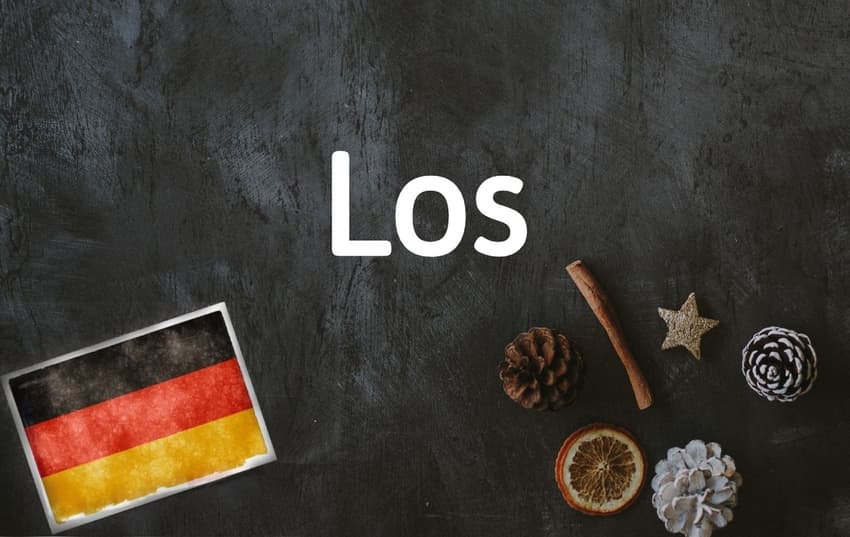German word of the day: Los

This tiny German word has a huge range of meanings.
Why do I need to know los?
Because it’s a very common word in spoken German which crops up everywhere, from yoga classes to unemployment offices. We explain how it's used below.
What does it mean?
The word los has a wide variety of uses in the German language – it can be a noun, adjective, adverb, interjection, as well as a prefix and a suffix.
As an adjective it means “loose” in English and is used to describe something not firmly or tightly fixed in place. This is the kind of los you’re most likely to encounter in everyday life. If a German friend asks you why you’re looking a bit down, for example, they’ll probably say:
Was ist mit dir los?
This literally means “what’s loose with you?” but is used to mean “what’s up”?
Similarly, if there’s some commotion on the street outside your office, a German colleague might ask:
Was ist da los?
What’s up there?
Los is also commonly used as an exclamation, meaning “Go!”

Riders hold their grips on the steering wheel at the start of the second stage of the Tour de France in 2021. Photo: picture alliance/dpa/BELGA | Pool
At the start of a race, for example, instead of “On your marks - get set - Go!” you’ll hear auf die Plätze – fertig – Los!
You’ll also hear this type of los as a general encouragement or as an order to someone to make a move:
Worauf wartest du? Los!
What are you waiting for? Go!
Los as a prefix and suffix
When it appears at the beginning of a verb, los expresses the idea of starting or going. The verb losgehen, for example, means “to get going”, while loslassen - a favourite of German yoga teachers – means “to let go”.
When it appears at the end of a word, however, -los has a similar meaning to the English suffix “-less,” such as nutzlos (useless), harmlos (harmless) and arbeitslos (jobless).
READ ALSO: German word of the day: Krass
Los as a noun
As a noun, das Los has a very different definition and means “fate” or “lot”. Stemming from this meaning, das Los is also a common word for “lottery ticket" in German.
Comments (1)
See Also
Why do I need to know los?
Because it’s a very common word in spoken German which crops up everywhere, from yoga classes to unemployment offices. We explain how it's used below.
What does it mean?
The word los has a wide variety of uses in the German language – it can be a noun, adjective, adverb, interjection, as well as a prefix and a suffix.
As an adjective it means “loose” in English and is used to describe something not firmly or tightly fixed in place. This is the kind of los you’re most likely to encounter in everyday life. If a German friend asks you why you’re looking a bit down, for example, they’ll probably say:
Was ist mit dir los?
This literally means “what’s loose with you?” but is used to mean “what’s up”?
Similarly, if there’s some commotion on the street outside your office, a German colleague might ask:
Was ist da los?
What’s up there?
Los is also commonly used as an exclamation, meaning “Go!”

At the start of a race, for example, instead of “On your marks - get set - Go!” you’ll hear auf die Plätze – fertig – Los!
You’ll also hear this type of los as a general encouragement or as an order to someone to make a move:
Worauf wartest du? Los!
What are you waiting for? Go!
Los as a prefix and suffix
When it appears at the beginning of a verb, los expresses the idea of starting or going. The verb losgehen, for example, means “to get going”, while loslassen - a favourite of German yoga teachers – means “to let go”.
When it appears at the end of a word, however, -los has a similar meaning to the English suffix “-less,” such as nutzlos (useless), harmlos (harmless) and arbeitslos (jobless).
READ ALSO: German word of the day: Krass
Los as a noun
As a noun, das Los has a very different definition and means “fate” or “lot”. Stemming from this meaning, das Los is also a common word for “lottery ticket" in German.
Join the conversation in our comments section below. Share your own views and experience and if you have a question or suggestion for our journalists then email us at [email protected].
Please keep comments civil, constructive and on topic – and make sure to read our terms of use before getting involved.
Please log in here to leave a comment.